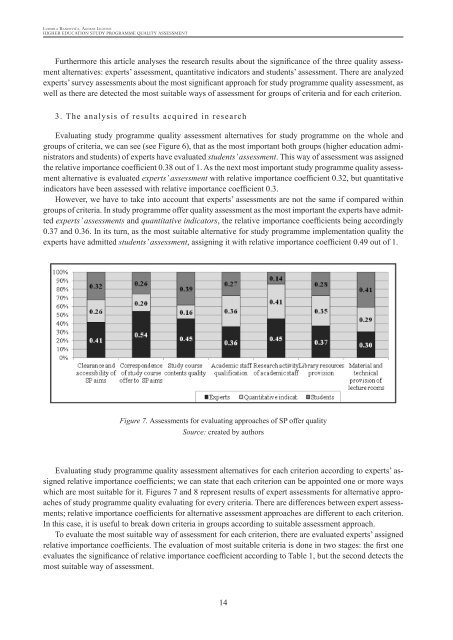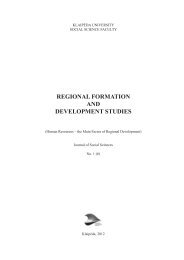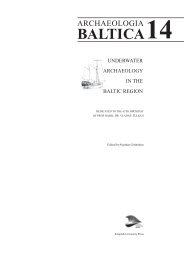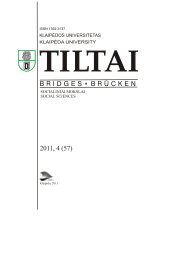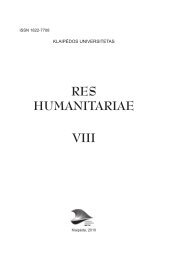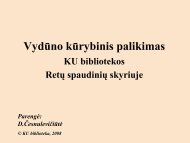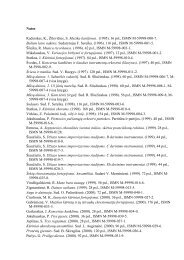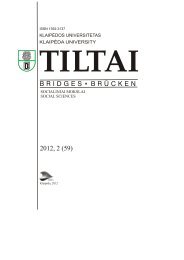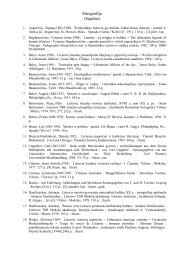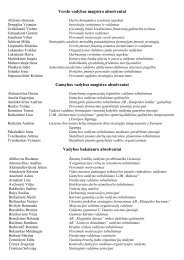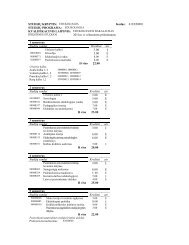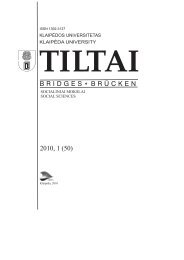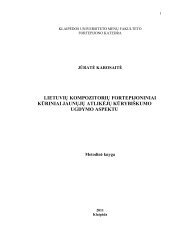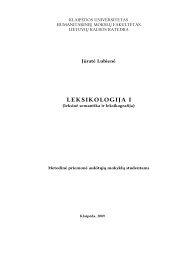regional formation and development studies - KlaipÄdos universitetas
regional formation and development studies - KlaipÄdos universitetas
regional formation and development studies - KlaipÄdos universitetas
Create successful ePaper yourself
Turn your PDF publications into a flip-book with our unique Google optimized e-Paper software.
Ludmila B<strong>and</strong>eviča, Agnese Līgotne<br />
HIGHER EDUCATION STUDY PROGRAMME QUALITY ASSESSMENT<br />
Furthermore this article analyses the research results about the significance of the three quality assessment<br />
alternatives: experts’ assessment, quantitative indicators <strong>and</strong> students’ assessment. There are analyzed<br />
experts’ survey assessments about the most significant approach for study programme quality assessment, as<br />
well as there are detected the most suitable ways of assessment for groups of criteria <strong>and</strong> for each criterion.<br />
3. The analysis of results acquired in research<br />
Evaluating study programme quality assessment alternatives for study programme on the whole <strong>and</strong><br />
groups of criteria, we can see (see Figure 6), that as the most important both groups (higher education administrators<br />
<strong>and</strong> students) of experts have evaluated students’ assessment. This way of assessment was assigned<br />
the relative importance coefficient 0.38 out of 1. As the next most important study programme quality assessment<br />
alternative is evaluated experts’ assessment with relative importance coefficient 0.32, but quantitative<br />
indicators have been assessed with relative importance coefficient 0.3.<br />
However, we have to take into account that experts’ assessments are not the same if compared within<br />
groups of criteria. In study programme offer quality assessment as the most important the experts have admitted<br />
experts’ assessments <strong>and</strong> quantitative indicators, the relative importance coefficients being accordingly<br />
0.37 <strong>and</strong> 0.36. In its turn, as the most suitable alternative for study programme implementation quality the<br />
experts have admitted students’ assessment, assigning it with relative importance coefficient 0.49 out of 1.<br />
Figure 7. Assessments for evaluating approaches of SP offer quality<br />
Source: created by authors<br />
Evaluating study programme quality assessment alternatives for each criterion according to experts’ assigned<br />
relative importance coefficients; we can state that each criterion can be appointed one or more ways<br />
which are most suitable for it. Figures 7 <strong>and</strong> 8 represent results of expert assessments for alternative approaches<br />
of study programme quality evaluating for every criteria. There are differences between expert assessments;<br />
relative importance coefficients for alternative assessment approaches are different to each criterion.<br />
In this case, it is useful to break down criteria in groups according to suitable assessment approach.<br />
To evaluate the most suitable way of assessment for each criterion, there are evaluated experts’ assigned<br />
relative importance coefficients. The evaluation of most suitable criteria is done in two stages: the first one<br />
evaluates the significance of relative importance coefficient according to Table 1, but the second detects the<br />
most suitable way of assessment.<br />
14


